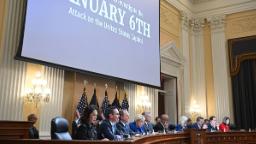[ad_1]

A version of this story appeared in CNN’s What Matters newsletter. To get it in your inbox, sign up for free here.
CNN
—
Nearly two years removed from the violent attack on the US Capitol, the House select committee tasked with finding out exactly what happened is about to show its hand.
The panel will hold its final public meeting on Monday, followed by the release of its full report on Wednesday. Unlike many previous gatherings, Monday’s is a business meeting rather than a hearing as no witnesses are set to testify.
And while we won’t know everything that’s to come from the January 6 committee this week until it unfolds, here’s what you need to know about what’s expected, what’s not, and where this could all lead.
Monday’s public meeting, scheduled for 1:00 p.m. ET, is expected to see the panel announce that it will refer at least three criminal charges against former President Donald Trump to the Justice Department, including:
- Obstruction of an official proceeding
- Conspiracy to defraud the federal government
The committee will release an executive summary of the investigation’s report on Monday after the meeting, a committee aide said Sunday. The final report, to be released two days later, will provide justification from the panel’s investigation for recommending the charges.
Why now? Republicans are expected to dissolve the panel when they take over the House in January.
A referral represents a recommendation that the Justice Department investigate and look at charging the individuals in question. But a referral by no means obligates federal prosecutors to bring such a case, so any move by the January 6 panel to approve a referral would be largely symbolic.
The federal investigation now being led by special counsel Jack Smith is examining Trump in its extensive probe into January 6, 2021, and it appears that DOJ investigators are already looking at much of the conduct that the select committee has highlighted.
But whether the department brings charges will depend on whether the facts and the evidence support a prosecution, Attorney General Merrick Garland – who will make the ultimate call on charging decisions – has said.
It’s a crime to assist or engage in “in any rebellion or insurrection against the authority of the United States or the laws.”
Judges have used the term “insurrection” to describe the January 6 attack on Congress’ certification of the 2020 presidential election. But the Justice Department has not opted to bring the charge in its hundreds of US Capitol riot cases.
Instead, prosecutors have relied on criminal statutes related to violence, obstruction of an official proceeding, and, in some limited cases, seditious conspiracy. So the House select committee referring Trump for such a charge would be a big deal.
For obstruction of an official proceeding and conspiracy to defraud the federal government, lawmakers can rely on an opinion from a federal judge in California, who wrote earlier this year that there was evidence that Trump and his allies were plotting to defraud the US government and to obstruct an official proceeding.
The opinion was handed down by US District Judge David O. Carter in a dispute over whether the House could access certain emails sent to and from former Trump attorney John Eastman. The judge cited emails discussing Trump’s awareness that certain voter fraud claims being made in court were inaccurate as evidence of a plot to defraud the federal government.
To explain his finding of evidence of obstruction, the judge pointed to emails that showed that the Trump team was contemplating filing lawsuits not to obtain legitimate legal relief, but to meddle in congressional proceedings.
Democratic Rep. Adam Schiff, a member of the select committee, said Sunday that the panel is considering how to hold accountable GOP lawmakers who defied their subpoenas.
“We will also be considering what’s the appropriate remedy for members of Congress who ignore a congressional subpoena, as well as the evidence that was so pertinent to our investigation and why we wanted to bring them in,” the California Democrat told CNN’s Jake Tapper on “State of the Union.”
“That will be something we will be considering tomorrow,” Schiff added, noting that the panel has weighed whether it is better to criminally refer members of Congress to other parts of the federal government or if Congress should “police its own.”
Such congressional mechanisms could include censure and referrals to the House Ethics Committee. (Democratic Rep. Bennie Thompson of Mississippi, the chair of the January 6 committee, has previously said the panel could issue five to six other categories of referrals besides criminal ones to the DOJ.)
Five House Republicans have been subpoenaed by the January 6 panel: GOP leader Kevin McCarthy and Reps. Jim Jordan of Ohio, Mo Brooks of Alabama, Andy Biggs of Arizona and Scott Perry of Pennsylvania.
CNN previously reported that the panel has also weighed criminal referrals for a number of Trump’s closest allies, including Eastman, former White House chief of staff Mark Meadows, former Justice Department official Jeffrey Clark and Trump’s former lawyer Rudy Giuliani, according to multiple sources.
Another source cautioned at the time that while names were being considered, there was still discussion to be had before they were finalized.
[ad_2]
